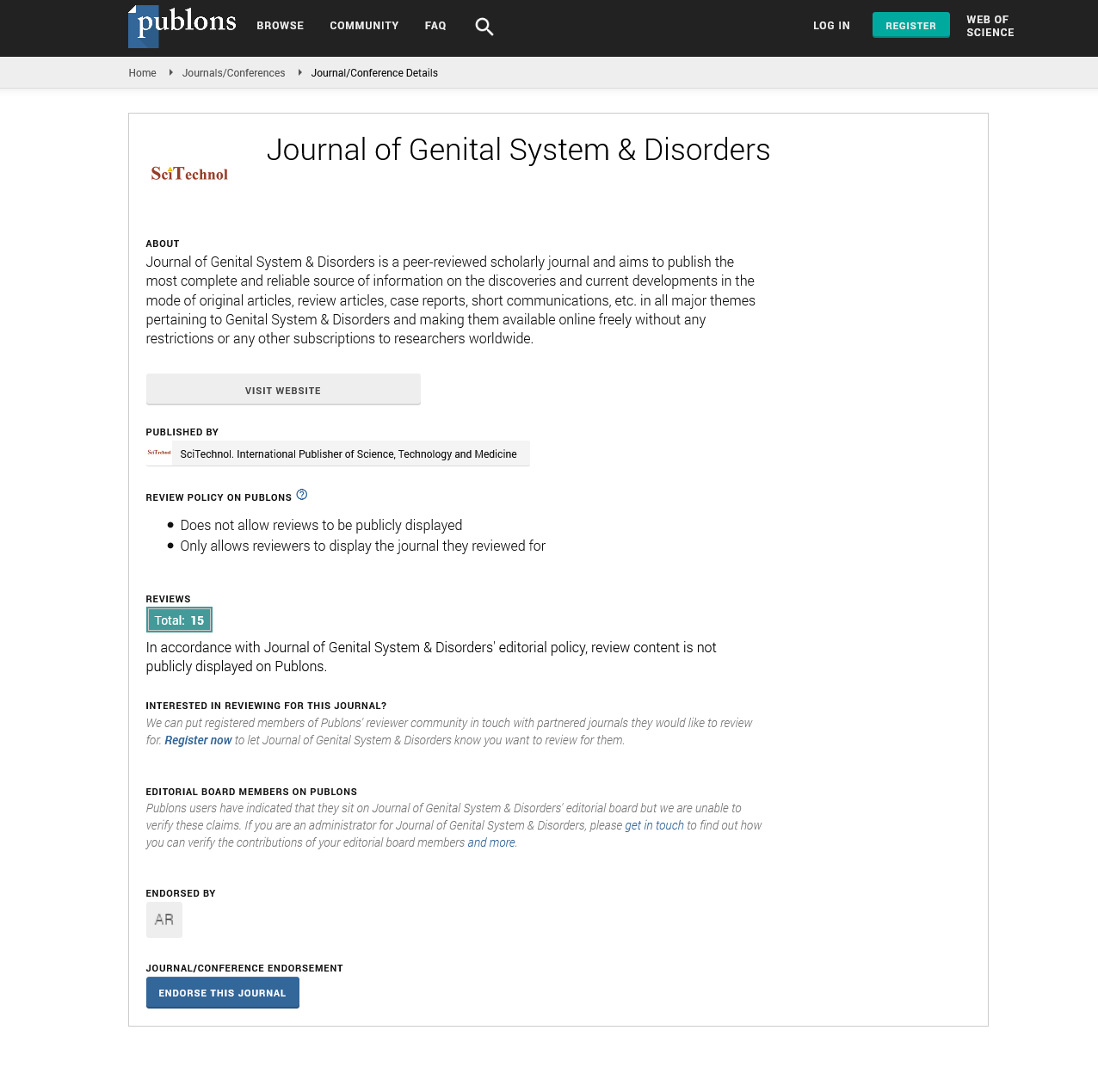Opinion Article, J Genit Syst Disord Vol: 11 Issue: 5
The Prevalence of Sleep Disorders in an Infertile Female Population
Hamamy Reman*
Department of Obstetrics and Gynecology, Tanta University, Tanta, Egypt
*Corresponding Author: Mutierez Gegan
Department of Obstetrics and Gynecology, Tanta University, Tanta, Egypt
Email: hamany64@gmail.com
Received date: 19 August, 2022, Manuscript No. JGSD-22-60062;
Editor assigned date: 21 August, 2022, Pre QC No. JGSD-22-60062 (PQ)
Reviewed date: 03 September, 2022, QC No. JGSD-22-60062;
Revised date: 13 September, 2022, Manuscript No. JGSD-22-60062 (R);
Published date: 21 September, 2022, DOI: 10.4172/ 2325-9728.100262
Citation: Reman H (2022) The Prevalence of Sleep Disorders in an Infertile Female Population. J Genit Syst Disord 11:5.
Keywords: Adolescent and Pediatric Gynecology,Biochemistry of Reproductive Science, Cervical Pathology
Introduction
To investigate the correlation and linkage between female does disease exist at the time of the ART management cycles and the reproductive clinical outcomes. A retrospective clinical research trial analysis of 1000 IVF and 400 ICSI cycles the research data was obtained from the medical records of cases whether healthy or diseased as regards medical aspects. Cases have undergone the first intended oocyte retrieval cycle all female cases recruited within the research revealed either none or just a single episode of live birth. Live birth involved the birth of at least one living child, irrespective of the gestational duration. Research efforts have shown that morbid medical diseases and chronic conditions have common genetic susceptibility aspects to infertility such as cases affected by polycystic ovarian syndrome are shown to have liability for development of type 2 DM.
The current research study reveal a considerable correlation between most preexisting diseases investigated presenting at the time of the first oocyte retrieval management cycle and lower rates of live birth. Comparative statistical analysis between healthy cases and diseased cases regarding basal laboratory data, oocytes count, sperm count, fertilization rate and outcome in which there was no statistical significant difference basal AMH, FSH, LH, E2, TSH, Oocytes count per patient, Total sperm count (x106/ml), Fertilization rate per patients. However the Rate of clinical pregnancy and cycle cancelation was statistically significantly higher among the health research group(p values=0.001). Statistical logistic regression analysis for association between maternal morbid disease and IVF/ICSI outcome among the studied cases in which there was statistical significance as regards clinical pregnancy and cycle cancelation.
Chronic Conditions
Research efforts all over the globe have revealed that infertility doesn’t take place in a random manner among the population. In an interesting manner it was observed that, infertile cases are categorized by distinct Infertility pathophysiological complex etiologies in some clinical scenarios at molecular and cellular levels
Infertility issues and correlated medical conditions are considered a major challenge to all reproductive specialists and practitioners all over the globe. Co-management of medical diseases and infertility maximizes the cases benefits and upgrades the level of health services offered. Interestingly previous research efforts have shown that morbid medical diseases and chronic conditions have common genetic susceptibility aspects to infertility such as cases affected by polycystic ovarian syndrome are shown to have liability for development of type 2 DM. Fertility capacity requires an intact physiological pathway that are affected by different aspects whether at endocrinal diseases, gastrointestinal issues and psychiatric disorders. Ovulatory defects are well correlated to different endocrinological issues such as hyper or hypothyroid diseases that denote that research efforts should focus on investigating the common linkage and origin causing the presenting infertility symptom. A major research interest is to analyses the correlation and linkage at pathophysiological and clinical levels between various morbid medical diseases and infertility issues and aspects. Common molecular and genetic linkages have been demonstrated between infertility issues presenting in every day practice and medical morbid conditions .one of the most famous infertility medical linkages is polycystic ovarian syndrome in which this is considered a metabolic hormonal issue that could present in the form of hirsutism delayed conception or type 2 DM particularly in cases having obesity issues. Another interesting correlation is cases having psychiatric illnesses taking antipsychotic agents causing hyperprolactinemia. The familial tendency for autoimmune diseases denotes its genetic background and it was well demonstrated that some autoimmune disorders such as systemic lupus have been correlated to infertility aspect suchanovulation and reduced endometrial receptivity capacity that was well demonstrated by molecular and genetic bases research efforts.
Additional research analyses performed by previous investigators have revealed that there is negative impact of medical diseases on odds of cumulative live birth particularly in cases having endocrinal, nutritional, and metabolic illnesses those research findings further verify the current research study findings and could be justified by the fact that impaired physiological aspects in those cases makes the ART management cycles less effective due to defective ovulation and other In an interesting fashion cases having obesity issues had enhanced fertility capacity well demonstrated after bariatric surgeries It was shown in a manner that is in harmony to the current research study data analyses that cases having depressive disorders. A previous research effort similar to the current study in approach and methodology have interestingly revealed and displayed the following results in which in comparison and contrast between healthy and diseased females the diseases study subjects have shown lower odds of live birth denoting the lower fertility capacity among medically diseased cases and could be justified by the fact that usually medically affected cases have endocrinal and endometrial issues that hinder the fertility capacity. Further research data analyses from prior research efforts have revealed an displayed that subclinical iodine- deficiency among hypothyroid cases in conjunction to with autoimmune thyroiditis diseases had statistically significantly reduced odds of live birth among cases managed by IVF/ICSI Management cycles.
Require fertility tools to maintain gestation that was additionally observed in diabetic cases in previous research efforts being liable to pelvic inflammatory issues causing defective implantation capacity. those findings denote the capability and capacity to upgrade the fertility potential of cases when the proper management line is performed for the chronic morbid condition.
It had non-statistically significant higher odds of cumulative live birth in comparison to healthy women when being on proper medication such as antidepressants that further denotes that medical management of chronic disorders and issues is a part of managing infertility issues presented to the reproductive specialist in every day practice.
 Spanish
Spanish  Chinese
Chinese  Russian
Russian  German
German  French
French  Japanese
Japanese  Portuguese
Portuguese  Hindi
Hindi 
